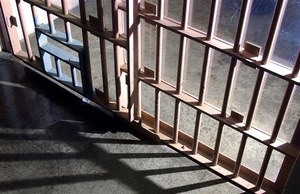C10, the omnibus crime bill, passed third reading and is now over to the Senate for what is supposed to be sober second thought. The vote could only have been a depressing anticlimax for the many Canadians who were fighting to stop or amend this legislation. And the implacable inevitability of its passage must surely lead many to ask, ‘why bother, what’s the point?’
 This question takes on added poignancy as we read with increasing frequency articles describing the relatively unconstrained power of the current majority government to do as it pleases, impervious to opposition voices or contrary evidence. I was watching Jamie Watt on CBC explaining that Canadians were turning the page on the crime issue (and, for that matter, Kyoto) and so, the message goes, it’s time to get over it.
This question takes on added poignancy as we read with increasing frequency articles describing the relatively unconstrained power of the current majority government to do as it pleases, impervious to opposition voices or contrary evidence. I was watching Jamie Watt on CBC explaining that Canadians were turning the page on the crime issue (and, for that matter, Kyoto) and so, the message goes, it’s time to get over it.
Well, maybe not. Thankfully many are not willing to “get over it”. How heartening, for example, to hear Leadnow.ca announce that they were simply regrouping for the next stage of their campaign for better justice policy. So, here are some reasons not to turn the page, instead to continue the fight.
1) Those who spoke to Parliamentary Committees, wrote letters and op eds, called their MPs or took to the streets have made a difference.
All the opposition parties opposed this bill, rejected the smears that they were “soft on crime”, and focused on public safety rather than easy politics. It has not always been so. And that means that the options are finally being put before Canadians, options for a Canada that is safer, not meaner.
Premiers, whatever their views on the bill, are demanding a more respectful federalism where they – who must administer the legislation once passed – should be engaged at the outset so that they can bring their views and experience to bear. And several are arguing that they should not have to reallocate money – say from health and education – to pay for the costs of more incarceration and more prisons.
And through the efforts of dozens of organizations, many more Canadians are now paying attention. And that can only be a good thing.
2) The process is not over.
Whatever one’s views of the senate and its reform, that institution has often played an important role in bringing a reflective, evidence-based perspective to bear on proposed laws. Because the members do not face reelection, they are in a good position to avoid the worst excesses of junk politics where pandering trumps the long-term interests of Canadians.
We know that there is a remarkable consensus among the experts here in Canada and more broadly that aspects of the proposed legislation will make things worse and will certainly divert money better spent on prevention, education, rehabilitation where possible, restoration and help to victims, and the safe reintegration of offenders into the community.
Of course, we can all do the math. A Conservative majority in the Senate tells us that the bill will pass, yet again, with the same anticlimax we saw earlier this week. But the Senate does have a job to do and there is definitely work to be done. Let’s hear the evidence, the experts, the risks, the costs.
3) This legislation is transformative as it puts punishment and prison at the centre of our criminal justice system.
This has never been the Canadian approach; our balanced justice policies have always focused on safety and justice – and the best evidence of what works. Such a change in direction should never happen without a vigorous debate – a good fight.
That’s all the more important because as we have seen in the U.S., this punitive approach leads to more of the same. It feeds our fears and, when we see that we are no more safe, rather than reverse course we opt for even more imprisonment, even tougher sentences. This beast, the more you feed it the hungrier it gets.
In the U.S., state after state is trying to reverse course but that is no easy task once you have built and filled all those prisons, once you have created a permanent underclass on the one hand and gated communities on the other. We do not want to go that way.
4) In fighting this kind of legislation we are also fighting for a different kind of politics.
Who of us isn’t sometimes afraid, especially for our kids, often angry and horrified at some of the terrible crimes we see on the news, and moved by the suffering of victims and their families. And we know our own frailties, that we can confuse justice and revenge, that our anger can blot out the evidence, that we sometimes lash out and act against our own best interests.
Fighting against this punitive bill is fighting against a politics that exploits our frailties rather than appealing to what is best in us.
5) And fighting against bad policy is good for the soul.

























Commentaires
Veuillez vous connecter pour poster des commentaires.